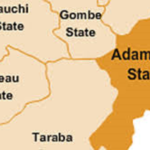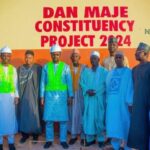History was made recently as the Executive Vice Chairman of the Nigerian Communications Commission (NCC), Prof Umar Garba and Governor of Central Bank of Nigeria, Mr Godwin Emefiele, signed a Memorandum of Understanding (MoU) to boost mobile money service penetration and financial inclusion in the country. Fielding questions from newsmen shortly aft er the signing of the MoU at the CBN Headquarters in Abuja, Danbatta said that the landmark event was an output of efforts of the joint committee set up by the two regulatory bodies.
“On the basis of the MoU we’ve signed, the two organisations have indicated commitment towards driving the financial inclusion in the country as well as ensuring improvement in the mobile money penetration,” he pointed out. Earlier, Danbatta told the CBN Governor that the NCC’s digital transformation policy was aimed at improving good governance with specific emphasis on key sectors of the economy like finance, education, and transportation. He said the commission will not rest on its laurels until similar efforts are replicated in other sectors of the economy in the digital transformation ecosystem.
In his remarks, however, the CBN Governor, noted that with the signing of the MoU the goal of achieving 80% penetration in financial inclusion is now realisable. “With this signing, we are now very sure that we will very easily improve the level of financial inclusion from the level it is today which is about 40% and we set a target for ourselves by 2020 that the level of financial inclusion should increase to close to 80%,” he said.
Speaking further, Mr Emefiele said that the MoU provides the framework for licensing of payment service providers and also guides the workings of the stakeholders both in the banking and telecommunication industries about driving not just the mobile payment but also the payment system in Nigeria. “Our teams have worked for several months trying to put together this landmark document with an intention to ensure that the NCC and the Central Bank of Nigeria can work together to produce a payment system in Nigeria, reducing cash transaction and enhancing cashless operations. It will also facilitate a more robust payment system,” he said.
 Join Daily Trust WhatsApp Community For Quick Access To News and Happenings Around You.
Join Daily Trust WhatsApp Community For Quick Access To News and Happenings Around You.


